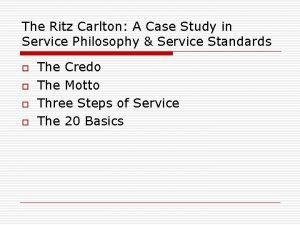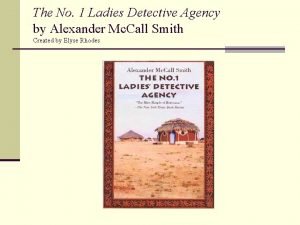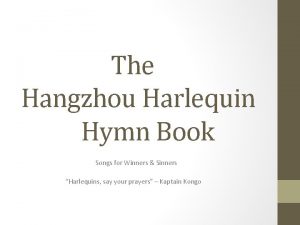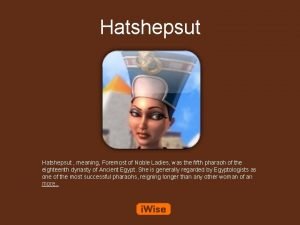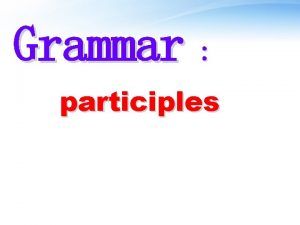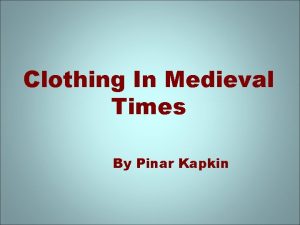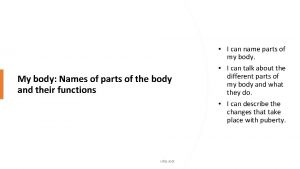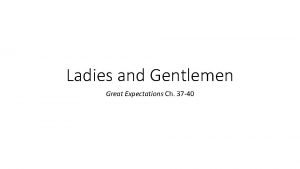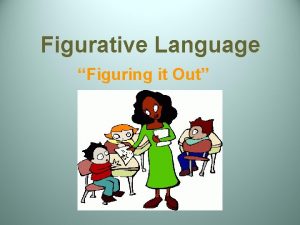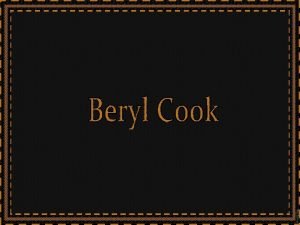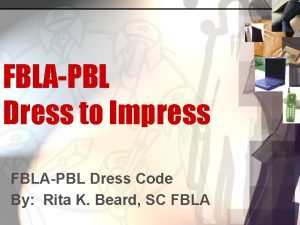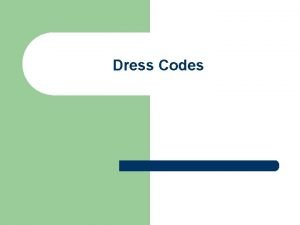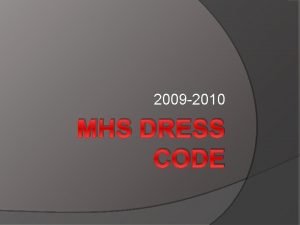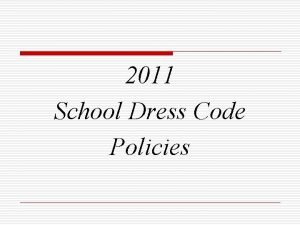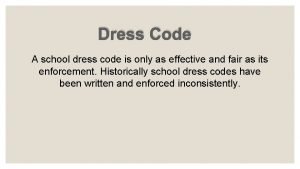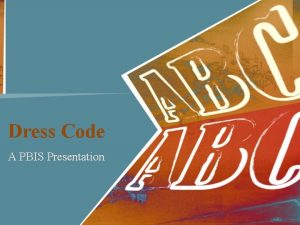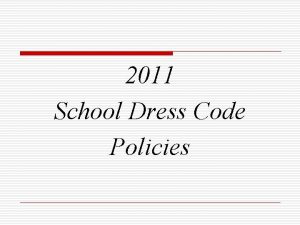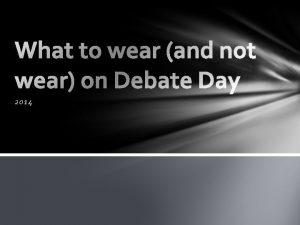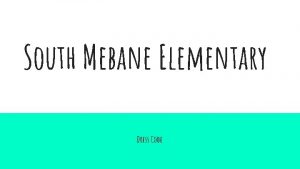John Cawse Parisian Ladies in their winter dress
























![[F]rom her window, she turned her eyes from the gloomy walls, in which she [F]rom her window, she turned her eyes from the gloomy walls, in which she](https://slidetodoc.com/presentation_image_h2/c6669217ed558cd9e1da6525f3d95d6f/image-25.jpg)





![[B]orn a woman—and born to suffer, in endeavouring to repress my own emotions, I [B]orn a woman—and born to suffer, in endeavouring to repress my own emotions, I](https://slidetodoc.com/presentation_image_h2/c6669217ed558cd9e1da6525f3d95d6f/image-31.jpg)


- Slides: 33

John Cawse, Parisian Ladies in their winter dress for 1800 (1799)

Richard Polwhele, ‘The Unsex’d Females’ (1798) A female band despising NATURE's law, As "proud defiance" flashes from their arms, And vengeance smothers all their softer charms. I shudder at the new unpictur'd scene, Where unsex'd woman vaunts the imperious mien; Where girls, affecting to dismiss the heart, Invoke the Proteus of petrific art; With equal ease, in body or in mind, To Gallic freaks or Gallic faith resign'd, The crane-like neck, as Fashion bids, lay bare, Or frizzle, bold in front, their borrow'd hair; Scarce by a gossamery film carest, Sport, in full view, the meretricious breast;

See Wollstonecraft, whom no decorum checks, Arise, the intrepid champion of her sex; O'er humbled man assert the sovereign claim, And slight the timid blush of virgin fame. "Go, go (she cries) ye tribes of melting maids, "Go, screen your softness in sequester'd shades; "With plaintive whispers woo the unconscious grove, "And feebly perish, as depis'd ye love. "What tho' the fine Romances of Rousseau "Bid the flame flutter, and the bosom glow; "Tho' the rapt Bard, your empire fond to own, "Fall prostrate and adore your living throne, "The living throne his hands presum'd to rear, "Its seat a simper, and its base a tear; "Soon shall the sex disdain the illusive sway, "And wield the sceptre in yon blaze of day;

"Ere long, each little artifice discard, "No more by weakness winning fond regard; "Nor eyes, that sparkle from their blushes, roll, "Nor catch the languors of the sick'ning soul, "Nor the quick flutter, nor the coy reserve, "But nobly boast the firm gymnastic nerve; "Nor more affect with Delicacy's fan "To hid the emotion from congenial man; "To the bold heights where glory beams, aspire, "Blend mental energy with Passion's fire, "Surpass their rivals in the powers of mind "And vindicate the Rights of Womankind. "

Wollstonecraft’s Vindication Who Wollstonecraft is arguing against: • Literary figures such as Pope and Milton who portray women as weak and subordinate. • John Gregory, writer of Legacy to his Daughters (1774). • Jean-Jacques Rousseau’s Émile (1762).

Wollstonecraft’s Vindication: key arguments Overriding belief in the power of reason and the ‘the perfectibility of human reason’. ‘Reason is […] the simple power of improvement; or, more properly speaking, of discerning truth. ’

Wollstonecraft’s Vindication: key arguments Overriding belief in the power of reason and the ‘the perfectibility of human reason’. ‘Reason is […] the simple power of improvement; or, more properly speaking, of discerning truth. ’ Women, like men, are rational creature – thus entitled to the same fundamental rights, legally, politically, institutionally. Women have a right to, and a need of, education.

Wollstonecraft’s Vindication: key arguments Society values ‘innocence’ in women. But this innocence is synonymous with ignorance. ‘If then women are not a swarm of ephemeron triflers, why should they be kept in ignorance under the specious name of innocence? ’ ‘Ignorance is a frail base for virtue!’

Wollstonecraft’s Vindication: key arguments Notions of modesty and beauty function to weaken and ‘enslave’ women. Society teaches women that their beauty is a virtue and the source of power. But this ideology denies them knowledge, dims their mental faculties, and encourages them to value triviality and affectation. ‘Taught from their infancy that beauty is woman's sceptre, the mind shapes itself to the body, and, roaming round its gilt cage, only seeks to adorn its prison. ’ ‘genteel women are, literally speaking, slaves to their bodies, and glory in their subjection’.

Wollstonecraft’s Vindication: key arguments Notions of modesty and beauty function to weaken and ‘enslave’ women. Society teaches women that their beauty is a virtue and the source of power. But this ideology denies them knowledge, dims their mental faculties, and encourages them to value triviality and affectation. ‘'Educate women like men, ' says Rousseau, 'and the more they resemble our sex the less power will they have over us. ' This is the very point I aim at. I do not wish them to have power over men; but over themselves. ’

Wollstonecraft’s Vindication: key arguments If men were raised in the same manner, they would be as ‘weak’ as women. ‘Educated in slavish dependence, and enervated by luxury and sloth, where shall we find men who will stand forth to assert the rights of man. ’

Wollstonecraft’s Vindication: key arguments There should be only one standard of human virtue, applicable to men as much as women. ‘If women are by nature inferior to men, their virtues must be the same in quality, if not in degree, or virtue is a relative idea; consequently, their conduct should be founded on the same principles, and have the same aim. ’ End to the sexual double standard, whereby women were held to account for standards of sexual morality that men themselves did not practise.

Wollstonecraft’s Vindication: key arguments ‘It is time to effect a revolution in female manners’ ‘Pleasure is the business of woman's life, according to the present modification of society, and while it continues to be so, little can be expected from such weak beings […] they have, to maintain their power, resigned the natural rights, which the exercise of reason might have procured them, and chosen rather to be short-lived queens than labour to obtain the sober pleasures that arise from equality. Exalted by their inferiority (this sounds like a contradiction), they constantly demand homage as women, though experience should teach them that the men who pride themselves upon paying this arbitrary insolent respect to the sex, with the most scrupulous exactness, are most inclined to tyrannize over, and despise, the very weakness they cherish. ’

Wollstonecraft’s Vindication: key arguments This reform in manners includes women’s refusal to indulge in sensibility, which weakens them by making them more susceptible to emotion and less to reason: Novels, music, poetry, and gallantry, all tend to make women the creatures of sensation, and their character is thus formed in the mould of folly during the time they are acquiring accomplishments, the only improvement they are excited, by their station in society, to acquire. This overstretched sensibility naturally relaxes the other powers of the mind, and prevents intellect from attaining that sovereignty which it ought to attain to render a rational creature useful to others, and content with its own station: for the exercise of the understanding, as life advances, is the only method pointed out by nature to calm the passions.

Wollstonecraft’s Vindication: key arguments Once women seek and acquire education and the improvement of their minds, men will value them more and not less: ‘Besides, the woman who strengthens her body and exercises her mind will, by managing her family and practising various virtues, become the friend, and not the humble dependent of her husband. ’ Marriage must be reformed. Women should be permitted to enter fields such as study and paid employment: thus allowed to achieve economic independence.

Wollstonecraft’s Vindication: key arguments Equality is key. Wollstonecraft’s argument about women are bound up with her radical belief in a fair and entirely equal society. Husbands repeatedly compared to ‘kings’, ‘tyrants’ and ‘absolute monarchs’. The rich, like women, are weak through a lifestyle of pleasure and triviality.

Wollstonecraft’s Vindication: problems? ‘Do the women who, by the attainment of a few superficial accomplishments, have strengthened the prevailing prejudice, merely contribute to the happiness of their husbands? Do they display their charms merely to amuse them? And have women, who have early imbibed notions of passive obedience, sufficient character to manage a family or educate children? ’ ‘I think I see her surrounded by her children, reaping the reward of her care. The intelligent eye meets hers, whilst health and innocence smile on their chubby cheeks, and as they grow up the cares of life are lessened by their grateful attention. She lives to see the virtues which she endeavoured to plant on principles, fixed into habits, to see her children attain a strength of character sufficient to enable them to endure adversity without forgetting their mother's example. ’

Wollstonecraft’s Vindication: problems? I cannot help, agreeing with the severest satirist, considering the sex as the weakest as well as the most oppressed half of the species.

Wollstonecraft’s Vindication: problems? I am, indeed, persuaded that the heart, as well as the understanding, is opened by cultivation; and by, which may not appear so clear, strengthening the organs; I am not now talking of momentary flashes of sensibility, but of affections.

Detail of James Gillray, New Morality (1798), showing the ‘Cornucopia of Ignorance’.

The Jacobin Novel • Elizabeth Inchbald, A Simple Story (1791) • Thomas Holcroft, Anna St. Ives ( 1792) • William Godwin, Caleb Williams (1794) • Robert Bage, Hermsprong (1796) • Mary Hays, Memoirs of Emma Courtney (1796) See Gary Kelly, The English Jacobin novel 1780 -1805 (Oxford: Clarendon Press, 1976).

In many instances I could have made the incidents more dramatic, would I have sacrificed my main object, the desire of exhibiting the misery and oppression, peculiar to women, that arise out of the partial laws and customs of society. In the invention of the story, this view restrained my fancy; and the history ought rather to be considered, as of woman, than of an individual. The sentiments I have embodied. In many works of this species, the hero is allowed to be mortal, and to become wise and virtuous as well as happy, by a train of events and circumstances. The heroines, on the contrary, are to be born immaculate, and to act like goddesses of wisdom, just come forth highly finished Minervas from the head of Jove. (p. 67)

Abodes of horror have frequently been described, and castles, filled with spectres and chimeras, conjured up by the magic spell of genius to harrow the soul, and absorb the wondering mind. But, formed of such stuff as dreams are made of, what were they to the mansion of despair, in one corner of which Maria sat, endeavouring to recall her scattered thoughts! (p. 69)

Was not the world a vast prison, and women born slaves? Marriage had bastilled me for life. (p. 73) (p. 137)
![From her window she turned her eyes from the gloomy walls in which she [F]rom her window, she turned her eyes from the gloomy walls, in which she](https://slidetodoc.com/presentation_image_h2/c6669217ed558cd9e1da6525f3d95d6f/image-25.jpg)
[F]rom her window, she turned her eyes from the gloomy walls, in which she pined life away, on the poor wretches who strayed along the walks, and contemplated the most terrific of ruins—that of a human soul. What is the view of the fallen column, the mouldering arch, of the most exquisite workmanship, when compared with this living memento of the fragility, the instability, of reason, and the wild luxuriancy of noxious passions? (p. 76)

She heard her half speaking half cooing, and felt the little twinkling fingers on her burning bosom—a bosom bursting with the nutriment for which this cherished child might now be pining in vain. (p. 69)

An insulated being, from the misfortune of her birth, she despised and preyed on the society by which she had been oppressed, and loved not her fellow-creatures, because she had never been beloved. (p. 75)

Left in dirt, to cry with cold and hunger till I was weary, and sleep without ever being prepared by exercise, or lulled by kindness to rest; could I be expected to become any thing but a weak and rickety babe? Still, in spite of neglect, I continued to exist, to learn to curse existence. (p. 92) You taught me language; and my profit on't Is, I know how to curse. The red plague rid you For learning me your language! (The Tempest, Act 1, Scene 2)

I was accosted from different motives, and yielded to the desire of the brutes I met, with the same detestation that I had felt for my still more brutal master. I have since read in novels of the blandishments of seduction, but I had not even the pleasure of being enticed into vice. (p. 98)

The mind is necessarily imprisoned in its own little tenement; and, fully occupied by keeping it in repair, has not time to rove abroad for improvement. The book of knowledge is closely clasped, against those who must fulfil their daily task of severe manual labour or die; and curiosity, rarely excited by thought or information, seldom moves on the stagnate lake of ignorance. (p. 102)
![Born a womanand born to suffer in endeavouring to repress my own emotions I [B]orn a woman—and born to suffer, in endeavouring to repress my own emotions, I](https://slidetodoc.com/presentation_image_h2/c6669217ed558cd9e1da6525f3d95d6f/image-31.jpg)
[B]orn a woman—and born to suffer, in endeavouring to repress my own emotions, I feel more acutely the various ills my sex are fated to bear—I feel that the evils they are subject to endure, degrade them so far below their oppressors, as almost to justify their tyranny; leading at the same time superficial reasoners to term that weakness the cause, which is only the consequence of short-sighted despotism. (pp. 159 -60)

A false morality is even established, which makes all the virtue of women consist in chastity, submission, and the forgiveness of injuries. (p. 172)

The judge, in summing up the evidence, alluded to "the fallacy of letting women plead their feelings, as an excuse for the violation of the marriage-vow. For his part, he had always determined to oppose all innovation, and the newfangled notions which incroached on the good old rules of conduct. We did not want French principles in public or private life—and, if women were allowed to plead their feelings, as an excuse or palliation of infidelity, it was opening a flood-gate for immorality. (p. 174)
 A charger is defined as culinary
A charger is defined as culinary The credo ritz carlton
The credo ritz carlton Coast guard garrison cover
Coast guard garrison cover Winter kommt winter kommt flocken fallen nieder
Winter kommt winter kommt flocken fallen nieder Heute mittwoch guten morgen mittwoch winter
Heute mittwoch guten morgen mittwoch winter Es ist kalt es ist kalt flocken fallen nieder
Es ist kalt es ist kalt flocken fallen nieder John marshall middle school
John marshall middle school Two houses, both alike in dignity
Two houses, both alike in dignity Good morning lady and gentleman
Good morning lady and gentleman Thank you ladies and gentlemen
Thank you ladies and gentlemen The no.1 ladies detective agency summary
The no.1 ladies detective agency summary Harlequins rugby songs
Harlequins rugby songs What is aphrodite weakness
What is aphrodite weakness Ladies frisking booth
Ladies frisking booth Good afternoon ladies and gentlemen
Good afternoon ladies and gentlemen Hello ladies and gentleman
Hello ladies and gentleman Ammun meaning
Ammun meaning Good afternoon ladies and gentlemen
Good afternoon ladies and gentlemen Good evening ladies and gentlemen we are now
Good evening ladies and gentlemen we are now Grooming for interview
Grooming for interview What did lords and ladies wear in medieval times
What did lords and ladies wear in medieval times Ghusl steps for ladies
Ghusl steps for ladies Rock painting
Rock painting Ladies and gentlemen jesus
Ladies and gentlemen jesus Womans anatomy
Womans anatomy Ladies and gentlemen may i have your attention please
Ladies and gentlemen may i have your attention please Chapter 37 great expectations
Chapter 37 great expectations Lightning danced across the sky. *
Lightning danced across the sky. * Dear distinguished
Dear distinguished Boland golf union
Boland golf union Beryl cook ladies who lunch
Beryl cook ladies who lunch Dear ladies and gentlemen
Dear ladies and gentlemen Tassili ladies
Tassili ladies Reno shemale
Reno shemale

